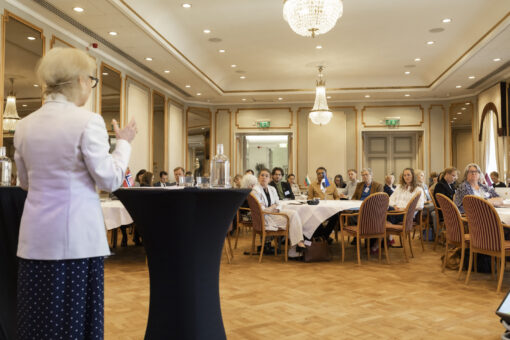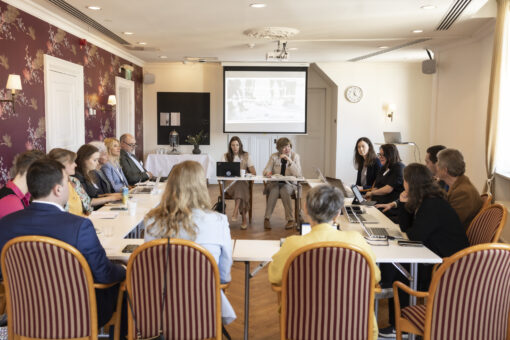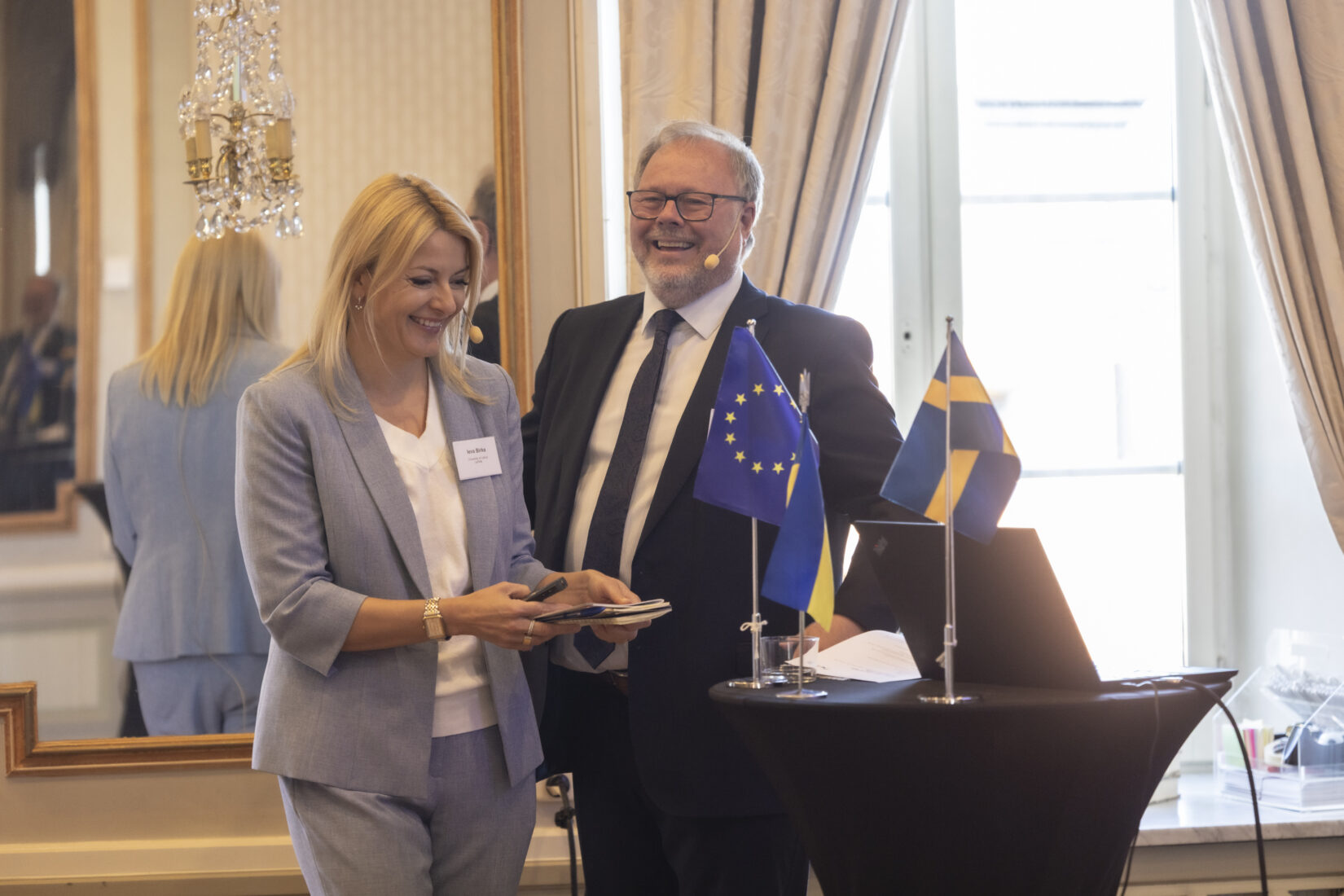The meeting, hosted by the Prime Minister’s Office of Sweden in cooperation with the Swedish Institute, the Norden Association, the County Administrative Board of Gotland, and Region Gotland, brought together nearly 60 participants from EU countries around the Baltic Sea – including Ukrainian colleagues.
It was held within the framework of the EU Strategy for the Baltic Sea Region (EUSBSR), which serves as a platform to strengthen cooperation among EU Member States in the region.
Anna Hagström, National Coordinator for the EUSBSR at the Prime Minister’s Office of Sweden, emphasized in her opening remarks that a prepared, resilient, and robust Baltic Sea region is a priority for the Swedish government – and a necessary direction for the region’s future. Continued and enhanced support for Ukraine is also central to this work.
The Visby meeting followed up on the EUSBSR Annual Forum held in Visby in October 2024. Its aim was to deepen cooperation among actors working on resilience and preparedness – topics discussed last autumn and deemed important to revisit.
Preparedness: Different Threats, Different Needs, Different Roles
Throughout the presentations, various aspects of preparedness were highlighted – from academia, youth, and the public sector.
In her opening speech, Charlotte Petri Gornitzka, Governor of Gotland County, stressed that preparedness is about protecting the values we hold dear. She emphasized the importance of understanding how people live today in order to plan for crises and war – it’s not just about shelters, but about enabling people to live as normally as possible even during prolonged crises.
Dr. Ieva Birka from the University of Latvia presented research on urban preparedness for emerging risks in the Baltic Sea Region. Her presentation in Visby was based on 2025 survey data from 1,000 respondents across key urban centres – Helsinki, Tallinn, Riga, Vilnius, and the German cities of Hamburg, Berlin, and Munich. The research shows that perceptions of threats vary both geographically and demographically. Despite widespread concern, preparedness remains low: few people know what to do in a crisis, and many lack basic resources at home. The need for locally adapted information is significant.
Annika Rinne from the Finnish National Rescue Association (SPEK) highlighted that Finland’s rescue services have their roots in civil society. This has fostered a culture of trust between authorities and volunteers, where volunteer competence is recognized and valued. Volunteers play a key role in crises – not only through practical support but also by strengthening social cohesion.
Sigge Eriksson from the National Council of Swedish Youth Organisations (LSU) explained that LSU has its roots in Sweden’s Youth Preparedness Council, established in 1942 as a collaborative body between national youth organisations and public authorities. In Visby, he emphasized the importance of involving young people in preparedness efforts.
Discussions also underlined the importance of local capacity. Communities and municipalities – especially in geographically vulnerable areas such as islands – must strengthen their ability to manage disruptions or even war. The message was clear: we must move from preparedness to readiness – from planning to being able to act when crisis strikes.

Lessons from Ukraine
Ukraine has become a vital source of knowledge for the Baltic Sea region when it comes to practical crisis preparedness.
Sofia Westberg from the Swedish Civil Contingencies Agency (MSB), currently based in Kyiv, shared how Sweden has contributed to Ukraine’s resilience through coordination, training, and expert support. She also noted the valuable insights gained for Sweden’s own preparedness: rapid coordination, clear responsibilities, and dedicated resources for receiving and managing support are essential.
A particularly powerful lesson is how Ukraine integrates recovery into resilience. After attacks, damaged buildings are quickly repaired, windows boarded up, and public spaces cleared – all to help people return and regain a sense of normalcy. Even symbolic values are protected, such as statues wrapped in sandbags, reminding people that life continues after war.
Dr. Oleksandra Keudel from the Kyiv School of Economics presented findings from her research on how Ukrainian municipalities have developed new forms of civic engagement during the war. Through social media, dialogue with residents, and collaboration with volunteers, local authorities have managed to mobilize resources, disseminate information, and strengthen legitimacy – despite the absence of elections and formal participation structures. The Ukrainian example shows that engagement can emerge spontaneously, and that both physical and digital spaces are needed to support collaboration in times of crisis.
Leadership, Trust, and Flexibility at the Heart of Crisis Response
Crises inevitably involve conflicting goals. Svante Aasbjerg Thygesen from the Royal Danish Defence College presented preliminary findings from the RESECTOR research project, which examines crisis management across countries using examples from the pandemic. The study shows that administrative traditions, multi-level trust, and the relationship between state and municipalities play a major role in how crises are handled. Coordination is crucial – but often difficult – and the ability to plan for the unexpected and act flexibly is essential.
Inese Suija-Markova, Deputy Chairwoman of Cēsis County Council, Latvia, emphasized that preparedness helps us respond to crises, but resilience is what enables communities to survive, recover, and thrive. She also stressed that culture plays a vital role in crisis preparedness – it is not a luxury, but a foundation for trust, identity, and sense of place.
Filip Reinhag, Regional Councillor and Chair of the Health and Medical Services Committee in Region Gotland, and President of the Conference of Peripheral Maritime Regions (CPMR), highlighted the need for pragmatism, trust, and long-term thinking in an era of continuous crises.
Four Themes for the Future
All participants engaged in discussions around four key themes:
- Sustainable energy supply: How can the Baltic Sea Region reduce its dependence on fossil fuels while ensuring energy security?
- Resilient food systems: What measures are needed to secure food supply in times of crisis?
- Critical societal functions: How do we protect infrastructure and public services from disruption?
- The role of the individual: How can we strengthen people’s knowledge and everyday preparedness?
The discussions led to agreements on specific areas within each theme where regional cooperation can add value. In some cases, participants already had concrete ideas for collaboration and initiatives to strengthen the region’s path forward.

Looking Ahead – Together
The conversations in Visby mark not an end, but a beginning. Participants now return to their respective countries and organisations with new insights and connections – with the goal of turning ideas into action. The next meeting of Baltic Sea Region stakeholders will take place in Sopot, Poland, during the 2025 Annual Forum of the EU Strategy for the Baltic Sea Region. There, the dialogue on building a safer and more resilient region will continue.
Facts
The EU Strategy for the Baltic Sea Region (EUSBSR), serves as a platform to strengthen cooperation among EU Member States in the region. The strategy is built on three objectives: saving the sea, connecting the region, and increasing prosperity. Within these objectives are 14 thematic policy areas, including bioeconomy, energy, health, and security. Each policy area is coordinated by representatives from one or more of the eight EU Member States involved.
